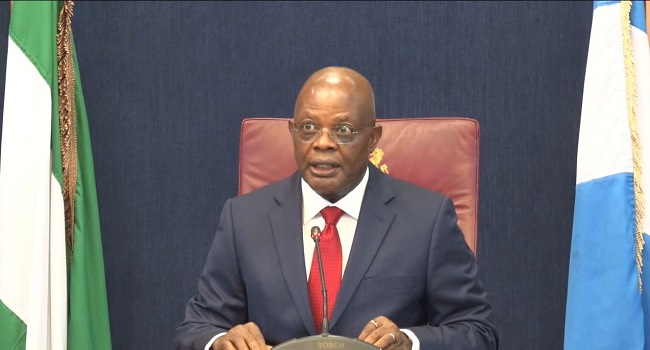The political landscape of Rivers State, Nigeria, has been embroiled in a controversy surrounding the retrieval of three official vehicles from the residence of the suspended Deputy Governor, Professor Ngozi Odu. This seemingly routine administrative action has ignited a firestorm of accusations and counter-accusations, pitting the Rivers State Sole Administrator, Vice Admiral Ibok-Ete Ibas (retd.), against a civic group, Democracy Watch Nigeria. The crux of the matter revolves around the manner in which the vehicles were retrieved, with Democracy Watch Nigeria alleging a forceful, military-style operation and the Sole Administrator asserting a routine retrieval of government property. This clash highlights the delicate balance between administrative authority and democratic principles, raising questions about the appropriate use of state power and the potential for its misuse to intimidate political opponents.
The incident unfolded with reports of military personnel, purportedly naval operatives acting on the orders of the Sole Administrator, entering Professor Odu’s Port Harcourt residence and removing two Toyota Hilux vans and a Toyota Hiace bus. Democracy Watch Nigeria swiftly condemned the action, characterizing it as a “disturbing show of force” and accusing Ibas of undermining democratic norms and employing state power to intimidate political rivals. Their statement portrayed the retrieval as a “commando-style raid,” emphasizing the alleged excessive use of force and the disregard for due process. They further argued that the act was intended to humiliate the office of the Deputy Governor, a constitutionally recognized institution, and called on national and international observers to take note of what they perceived as a growing trend of militarization and impunity within Rivers State.
In response to the accusations, the Sole Administrator, through his Senior Special Adviser on Media, offered a starkly different narrative. He described the outcry as a politically motivated attempt to misrepresent a standard administrative procedure. The official statement emphasized the necessity of securing government property, particularly in light of the declared state of emergency, and framed the retrieval as a responsible action to prevent misuse or vulnerability of state assets. The Sole Administrator questioned the rationale behind leaving the vehicles at the suspended Deputy Governor’s residence for over a month after the declaration of the state of emergency, implying a lack of justification for their continued presence there. He maintained that the recovery of government assets could not be reasonably interpreted as an overreach of executive power and reaffirmed the administration’s commitment to the prudent management of public resources.
The conflicting accounts of the incident have further fueled the controversy. While the government maintains that the retrieval was routine and justified, eyewitnesses corroborated the claims of a forceful operation, describing uniformed men, believed to be naval officers, taking control of the Deputy Governor’s residence and leaving with the vehicles. This discrepancy between the official narrative and eyewitness accounts raises concerns about transparency and accountability. The presence of military personnel in what is essentially an administrative matter adds another layer of complexity, raising questions about the appropriate use of military force in civilian affairs.
This incident has brought to the fore underlying tensions within Rivers State, highlighting the delicate balance between maintaining order and upholding democratic principles. The forceful retrieval of the vehicles, regardless of the justification provided by the Sole Administrator, raises concerns about the potential for the abuse of power and the intimidation of political opponents. The declaration of a state of emergency, while potentially providing a context for the retrieval, does not necessarily justify the methods employed. The use of military personnel in a seemingly administrative matter further complicates the situation and raises questions about the militarization of civilian governance.
The clash between the Sole Administrator and Democracy Watch Nigeria underscores the importance of due process and transparency in government actions. While the government has a legitimate interest in protecting public assets, the manner in which those assets are retrieved must be consistent with democratic principles and respect for individual rights. The use of excessive force, particularly involving military personnel, risks creating a climate of fear and intimidation, undermining the very principles of democracy that the government is tasked with upholding. The controversy surrounding this incident serves as a reminder of the ongoing need for vigilance in protecting democratic values and ensuring that government actions remain within the bounds of the law and respect for human rights.


